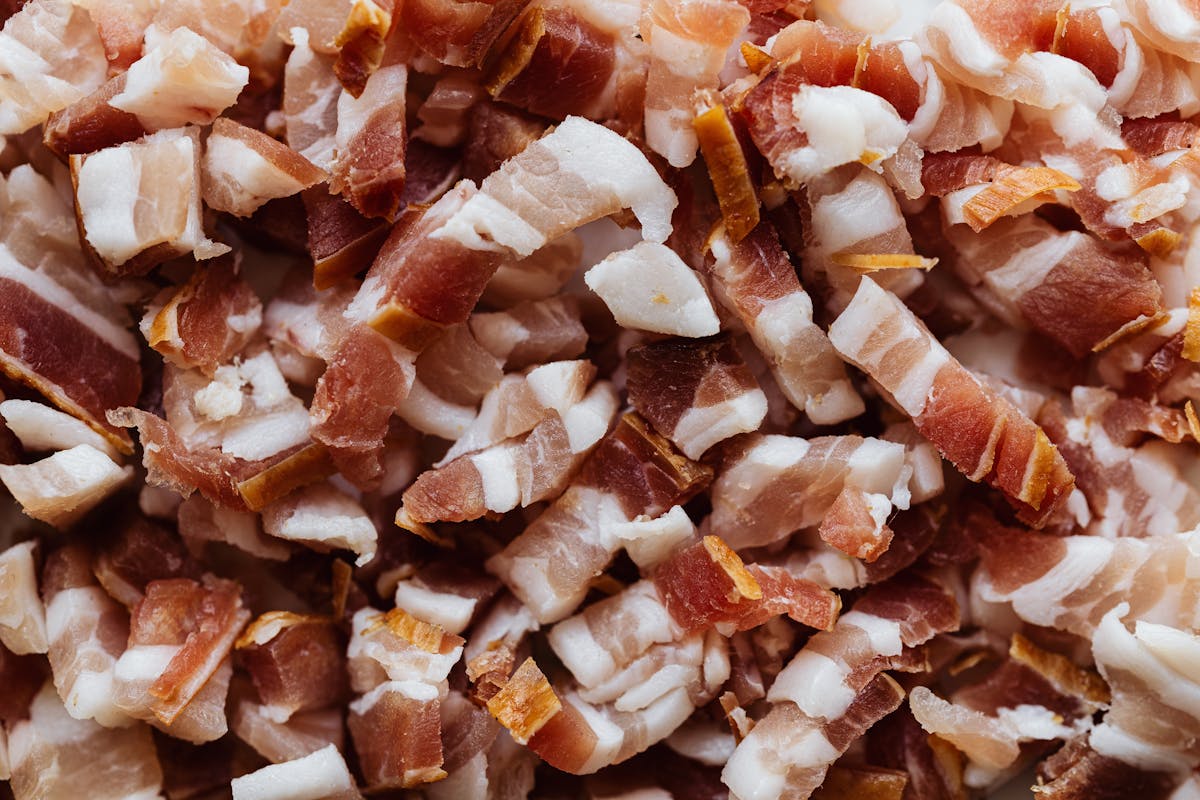When most people think of eating healthy meat, fruits and vegetables, you might not include a certain item. There’s an often-overlooked food product that has been ranked healthier than many green foods. Pork fat, also known as lard, has been rated as one of the healthiest meats you can consume, even scoring higher in nutritional value than vegetables like peas, tomatoes, and lettuce. While it might be surprising to some, lard can be a valuable addition to your diet when consumed in moderation. Let’s dive into why this seemingly indulgent fat is healthier than you may think and how it compares to vegetables in terms of nutritional benefits.
The Surprising Nutritional Value of Pork Fat
Pork fat has earned a place among the world’s healthiest foods. In a list that ranked the top 100 healthiest foods, pork fat placed eighth, surpassing many vegetables and fruits in nutritional score. It earned a score of 73 out of 100, outshining foods like red cabbage, sweet potatoes, and even tomatoes. This surprising ranking shows that, when it comes to providing essential nutrients, lard offers more than just flavor. It contains a healthy balance of fats, including beneficial monounsaturated fats, making it a more nutritious option than some may think. For those looking to get a more complete source of nutrients, lard can be a smart choice, especially when used in moderation and when sourced from healthy, pasture-raised pigs.

The Heart-Healthy Benefits of Monounsaturated Fats
Pork fat ranks highly in nutritional value due to its high concentration of monounsaturated fats, which are heart-healthy. These fats, especially oleic acid, also found in olive oil, promote cardiovascular health by reducing bad cholesterol levels. While saturated fats often get a bad reputation, monounsaturated fats are more beneficial in promoting overall heart health. Lard, when used in cooking, provides a healthier fat option compared to other animal fats, such as lamb or beef fat. This makes pork fat a better option for those looking to improve their diet without sacrificing flavor or texture in their meals.
Read More: 12 Best Foods To Support Digestive and Gut Health
Vitamin D and Fat-Soluble Nutrients in Pork Fat
Pork fat is also an excellent source of fat-soluble vitamins, particularly Vitamin D. This nutrient is essential for bone health, immune function, and overall well-being. Lard’s Vitamin D content is especially beneficial when sourced from pasture-raised pigs. Pigs raised outdoors and allowed to roam freely produce fat richer in essential nutrients, including Vitamin D. This means that lard from pasture-raised pigs offers an even healthier option, providing a greater nutritional profile than lard from conventionally raised pigs. These benefits make pork fat a more appealing option for those seeking to increase their Vitamin D intake, something that’s often difficult to find in vegetables.
Lard vs. Vegetables: The Surprising Nutritional Comparison
When comparing pork fat to vegetables, it’s important to consider the full nutritional spectrum. While vegetables are undeniably important for a healthy diet, some, like peas, red cabbage, and lettuce, don’t provide the same dense nutritional benefits as lard. Pork fat, in addition to its healthy fats, contains B vitamins, including B12 and riboflavin, which are crucial for energy production and maintaining a healthy nervous system. These nutrients are often more abundant in animal products and are harder to come by in plant-based foods. This makes the healthiest meat a superior choice in terms of specific nutrients that vegetables may not offer in comparable amounts.

The Importance of Moderation
Although pork fat offers various health benefits, it’s crucial to consume it in moderation. Like any fat, lard is calorie-dense, so overeating it can lead to excess calorie intake, which may contribute to weight gain or other health issues. However, when used sparingly in cooking, lard can add flavor and enhance the nutrient profile of a dish without significantly impacting your overall health. The key is moderation: by using pork fat in controlled amounts and balancing it with other healthy fats, you can enjoy the benefits of this nutritious fat without overdoing it.
Read More: Neurologists Share Foods They Would Never Eat and Why
Why Pasture-Raised Pork Fat is a Better Option
Not all pork fat is created equal; the way pigs are raised significantly affects the nutritional quality of the lard. Pasture-raised pigs, allowed to roam freely and eat a natural diet, produce fat rich in beneficial nutrients. This type of pork fat contains more omega-3 fatty acids, vitamin D, and other essential nutrients than fat from conventionally raised pigs. For the healthiest pork fat, it’s important to choose lard from pasture-raised pigs whenever possible. These pigs are typically fed a more natural diet, which results in higher-quality fat with superior nutritional benefits.
Lard in the Context of a Balanced Diet
While lard is an excellent source of essential nutrients, and it is considered the healthiest meat in one study, it should be consumed as part of a balanced diet that includes a variety of foods. Relying solely on pork fat would not provide all the nutrients your body needs, so it’s important to include vegetables, fruits, whole grains, and other protein sources in your meals. Lard can be used as a cooking fat, adding flavor to dishes, but should be paired with other nutrient-dense foods to create a well-rounded, healthful diet. Including a variety of foods in your meals ensures that you’re getting a broad range of vitamins, minerals, and other essential nutrients that support long-term health.

The Role of Ocean Perch: A Healthier Fish Option
While pork fat has earned its place on the list of the world’s healthiest foods, it’s worth noting that other animal-based foods also provide significant health benefits. Ocean perch, for example, is one of the healthiest fish you can eat. With a low calorie count and a high protein content, ocean perch provides 20 grams of protein per 100 grams of fish. It is also low in saturated fat, making it a heart-healthy choice that complements pork fat in a balanced diet. This deep-water fish, often referred to as rockfish, scored an impressive 89 out of 100 for nutritional value. Incorporating healthy fish like ocean perch into your diet along with pork fat provides a variety of nutrients that support overall health.
Conclusion: The Value of Pork Fat in a Healthy Diet
Incorporating pork fat, or lard, into your diet can offer numerous health benefits when consumed in moderation. It provides essential nutrients like monounsaturated fats, Vitamin D, and B vitamins, all of which contribute to heart health, immune function, and overall wellness. Additionally, pasture-raised pork fat offers superior nutritional value, making it a healthier choice than conventional lard. While vegetables remain a vital part of a healthy diet, it’s clear that pork fat can play a valuable role in providing nutrients that may be harder to find in plant-based foods. As with any dietary choice, balance and moderation are key. When used thoughtfully, pork fat can be a nutritious addition to a well-rounded, health-conscious diet.
Read More: Seed Oils vs. Animal Fats & Butter: Which Is the Healthier Choice?

